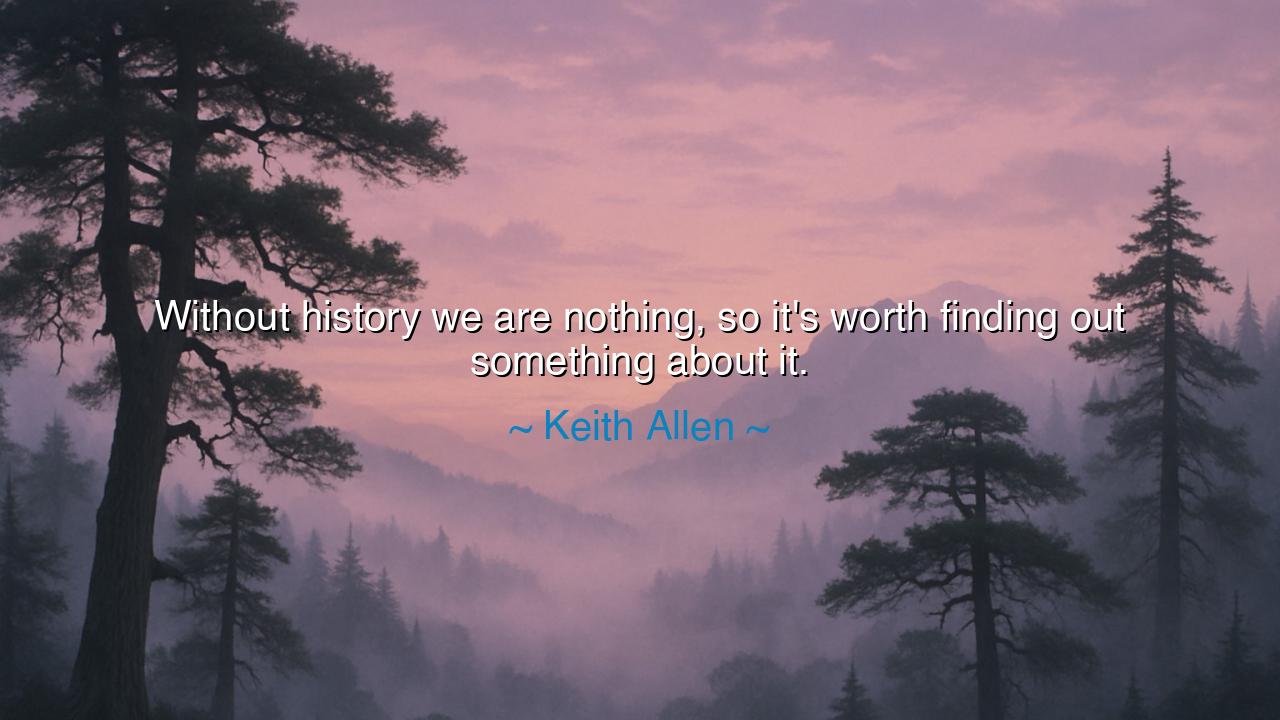
Without history we are nothing, so it's worth finding out






When Keith Allen said, “Without history we are nothing, so it’s worth finding out something about it,” his words rang with a simple yet eternal truth — that a people, a nation, or a soul cut off from its past becomes like a tree severed from its roots. In his plain speech lies the wisdom of the ages: that memory is identity, and that to live without remembrance is to drift through life without meaning. For history is not a collection of dusty records nor a dull tale of kings and wars; it is the living story of what we are — the breath of those who came before us, moving still through our thoughts, our customs, our very blood.
The origin of this quote springs from Allen’s lifelong fascination with human stories — with the flawed, glorious, and often forgotten tales that shape who we are. Though known as an actor and musician, his words reveal the philosopher’s heart that beats beneath the artist’s skin. He reminds us that to forget history is to deny our humanity, for every freedom we possess, every comfort we enjoy, was paid for by the struggles of those who walked before us. History is the soul’s inheritance — and to reject it is to squander a treasure that took millennia to gather.
In every age, there are those who have tried to erase or ignore the past. Empires that rewrite their failures, societies that silence their crimes, individuals who flee from their origins — all commit the same sin: amnesia of the soul. Consider the tragic rise and fall of ancient Rome. At its height, it commanded the world; but when Romans began to forget the virtues of their ancestors — discipline, duty, and devotion to the Republic — decay crept in. Luxury replaced labor, pride replaced purpose, and the empire that once shaped the world crumbled into dust. The lesson is timeless: when a people forget their beginnings, their end swiftly follows.
On the other hand, history, when remembered with reverence, becomes a lamp for the future. Japan, after the devastation of World War II, looked back to its heritage of perseverance — the bushido spirit of resilience and honor — and used that memory to rebuild a nation from ruins into one of peace and innovation. This is the power of remembrance: it turns suffering into strength, loss into wisdom. As Allen suggests, it is indeed “worth finding out something about it,” for knowledge of history is the compass that keeps us from wandering into the same abyss twice.
But Allen’s insight is not only for nations — it is for each individual heart. Every human being carries a private history, a lineage of triumphs and trials that shape the soul. To know one’s personal past, to understand one’s ancestors, is to know oneself. A person who has never paused to ask, “Where did I come from?” will forever struggle to answer, “Who am I?” The same truth that binds empires binds the human spirit: we are built of memories, and to lose them is to lose the self. Thus, to study history is not merely an academic act; it is a sacred form of self-knowledge.
And yet, history must not be worshipped blindly. For the past is not a prison, but a teacher. To revere history is not to chain ourselves to it, but to learn its lessons so we may walk forward with clearer eyes. Those who cling to the past without reflection risk repeating its errors; those who study it with understanding turn its burdens into blessings. The wise do not live in history, but live through it — carrying its lessons as light within them.
So, O seeker of truth, remember this: without history, we are shadows; with it, we become human. Learn the stories of your people, of your land, of your family. Read of the wars, but also of the peace that followed. Study the mistakes, but honor the courage that corrected them. For in the end, history is not a record of what was — it is a mirror of what is possible. Keith Allen’s words remind us to look into that mirror, not out of obligation, but out of reverence for life itself.
Thus, let it be written in the hearts of those who hear: to know history is to awaken. To forget it is to sleep forever in ignorance. Seek it with humility, listen to its whispers, and let its wisdom shape your days. For as long as we remember — truly remember — we remain connected to the vast chain of human existence, and in that connection, we are something: alive, aware, and eternal.






AAdministratorAdministrator
Welcome, honored guests. Please leave a comment, we will respond soon